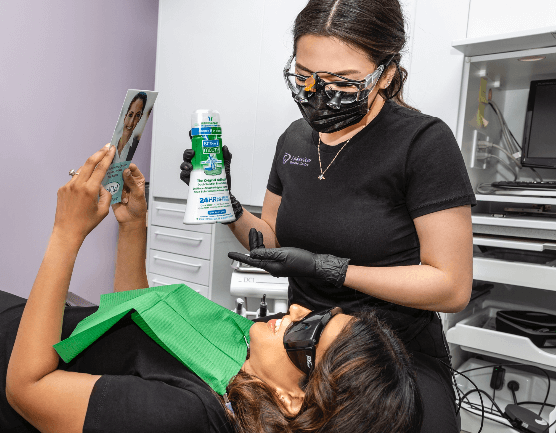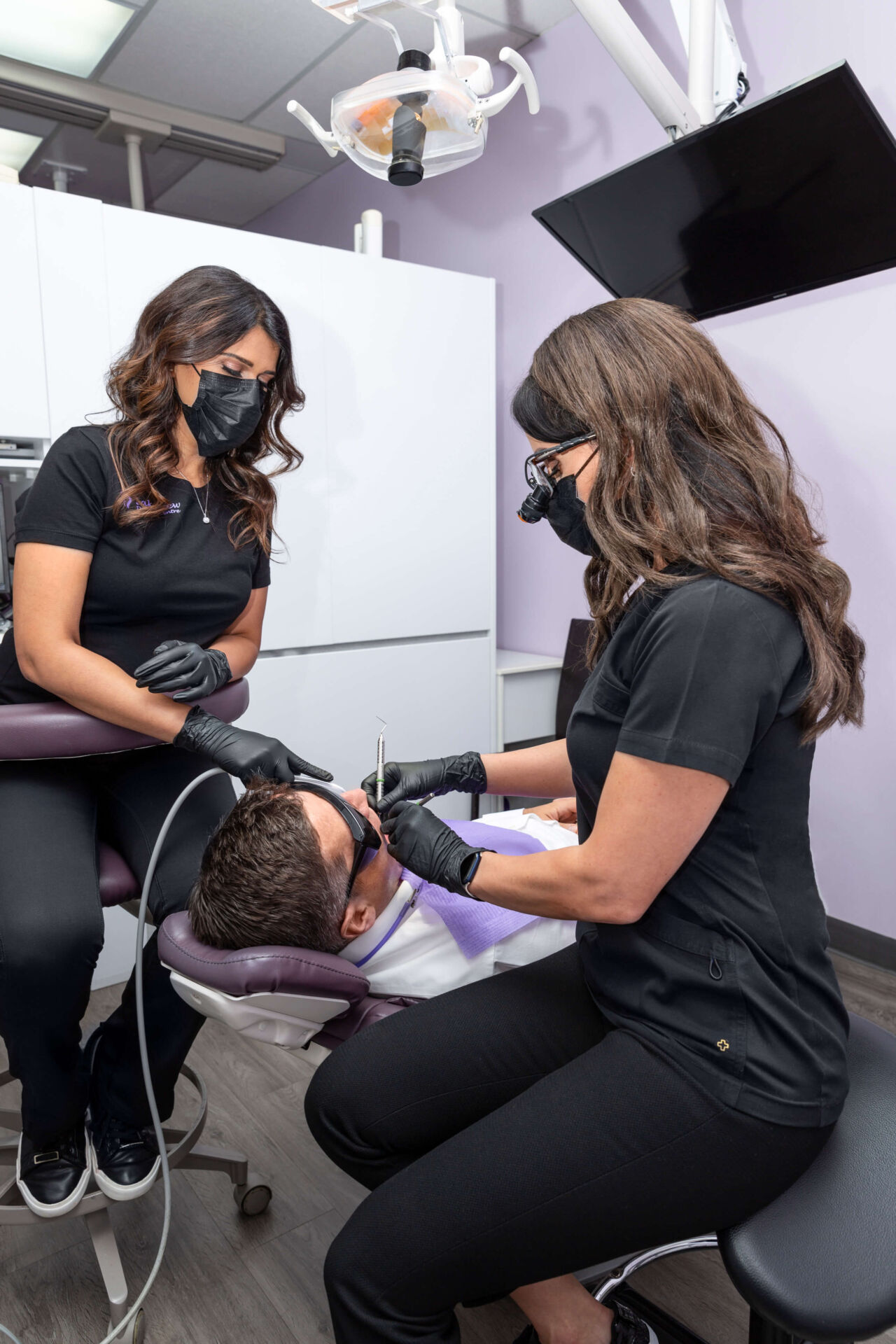Oral health is a good indicator of your overall health. Oftentimes, the mouth is often looked at as its own entity, separate from the rest of the body. In reality, your mouth is intricately connected to your body. Oral infections and gum disease have been found to be strongly linked to numerous medical problems, such as heart attacks, strokes, Alzheimer’s, arthritis, cancer, diabetes, premature/low weight births and more.
With that being said, poor oral health can endanger your overall health. That is why maintaining good oral hygiene and receiving professional cleanings are important to your health and quality of life.


At Lakeview Dental, our practice is based on oral health connection and prevention. We believe in the prevention of tooth loss and gum disease. We use the OraVital system to identify oral pathogens in the mouth that cause gum disease, such as gingivitis and periodontitis, and bad breath.
However, professional dental cleanings alone will not eliminate all infectious oral bacteria you may have. The OraVital system shows the cause and location of oral infections to your dentist and hygienist, this system includes an accurate diagnosis report and a predictable and effective treatment plan to treat your gum disease. Oral infections that cause bleeding, bone loss, and bad breath can now be diagnosed and treated early, which will help prevent further damage to the oral health of your mouth.
Book an appointmentDid you know that cavities and gum diseases are infectious diseases? Sharing a kiss or food with your loved ones can spread the oral bacteria.
At-home oral hygiene only addresses the surfaces that are being touched by your toothbrush, softpiks, floss, etc. Professional routine dental cleanings are important because it addresses the biofilm, plaque, and buildup hidden underneath the gums. This area is unreachable with at-home oral hygiene care. In order to maintain good oral hygiene in between dental visits, we recommend electric toothbrushes, softpiks, interproximal brushes, dental floss, medicated mouthwashes, tongue scrapers, and other dental products depending on the individual’s needs.
Being without gum disease means your gums don’t bleed when your hygienist flosses them or measures your pockets. Bleeding at these times indicates inflammation, which means gum disease.
Each tooth is connected to your brain and sinuses through its roots. An infection in the mouth can compromise your general health.
It is more cost-effective and a rather pleasant experience to have routine dental cleanings and checkups that help prevent cavities, versus having a cavity filled or restorative work done.
If buildup and bacteria are not removed regularly, this may lead to the buildup and bacteria moving down a tooth, where it can destroy bone and tissue, leading to early tooth loss.
Your hygienist is able to remove most of your dull/discoloured staining, which will leave you with a brighter and whiter smile.
Plaque, biofilm, buildup, bacteria, and infectious oral bacteria are the reasons why you may have bad breath. A thorough cleaning and proper treatment, depending on the individual’s needs, will leave your breath fresh and odour-free.
A full periodontal evaluation will identify signs of gum disease, bad breath, bone loss, and oral infection. When signs of gum disease are present, we recommend the use of the OraVital System which involves taking a swab sample from your gums and oral mucosa and sending it to a microbiology laboratory to identify the bacteria that is causing oral infection.
Dr. Newman will prescribe a specific OraVital antibiotic rinse and/or cream based on your detailed laboratory report. This will help control your infection by killing the harmful bacteria. Your hygienist will explain the most effective home care and oral hygiene regimen designed for you.
Professional routine dental cleanings will allow your dentist and hygienist to continuously monitor the oral health of your mouth, and look for any signs of bacterial deposits and bleeding. Routine dental cleanings and good oral hygiene at home will help prevent oral infections. This ensures a maintainable and better standard of oral care, preventing overall health problems caused by chronic infection originating from your mouth.
A periodontal chart will track the progress of your gum health over time. This will allow us to monitor your gums, and detect gum disease. A periodontal chart is done by taking 6 measurements (in millimeters) in between the gum and the enamel of each tooth, also known as a pocket reading.
Healthy gums have pocket readings that range between the depths of 1-3mm. The depth can increase when poor oral hygiene is performed, lack of care towards your teeth, and due to inflammation or decay found on the tooth. Any number found in the periodontal examination, that is 4-15mm, is considered unhealthy.
If you have gum disease, it is important to treat your bacterial infection right away. We recommend the OraVital treatment to help prevent further damage to the teeth and gums. In addition, multiple scale and root planing appointments are required to avoid plaque build-up from developing, with a possibility of needing gum surgery.
By spending the time to develop healthy oral hygiene habits and coming in for professional routine dental cleanings, you set yourself up for healthy teeth and gums. You can avoid serious dental issues such as periodontitis that require extractions and teeth replacement procedures.
Following what the hygienist and dentist recommendations are. Such as performing the measures listed below at least twice a day or after every meal:
Gum disease is not difficult to prevent, but once you develop gum disease, it is difficult to stop it and impossible to reverse it due to permanent bone loss. Keep in mind that gum disease is an infectious disease and you can pass it to your loved ones. Home care hygiene and professional routine dental cleanings are essential to keep your mouth and your overall health in check.
